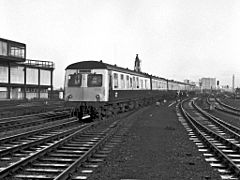British Rail Class 120 facts for kids
Quick facts for kids British Rail Class 120 |
|
|---|---|
 |
|
| In service | 1958-1989 |
| Manufacturer | BR Swindon Works |
| Operator(s) | British Rail |
| Specifications | |
| Car length | 64 ft 6 in |
| Width | 9 ft 3 in |
| Height | 12 ft 4 1/2 in |
| Maximum speed | 70 mph (112 km/h) |
| Weight | 36 tons 7 cwt |
| Prime mover(s) | BUT (AEC) 150 hp |
The Class 120 was a special type of train called a Diesel Multiple Unit, or DMU. It was designed to travel across the country. Each Class 120 train was made up of three connected carriages. The very first one was built in 1958 at the famous British Rail Swindon Works.
Contents
Meet the Class 120 Train
The Class 120 was an important part of British railway history. It helped people travel long distances across the country. These trains were known for being reliable and comfortable for their time.
What is a DMU?
A DMU stands for Diesel Multiple Unit. This means the train has its own engine in each carriage, or in some of its carriages. It doesn't need a separate locomotive to pull it. This makes DMUs very flexible and efficient for many routes.
Building the Class 120
The Class 120 trains were built by British Rail at their Swindon Works. This was a very large factory in England. Building started in 1958. These trains were designed to be strong and dependable. They were made to handle the busy railway lines of Britain.
Life on the Tracks
The Class 120 trains served the public for many years. They were in service from 1958 until 1989. This means they ran for over 30 years! They could reach a top speed of 70 miles per hour (112 km/h). Each train had a powerful BUT (AEC) 150 hp engine. These trains were a common sight on many cross-country routes. They helped connect towns and cities all over Britain.
Images for kids


